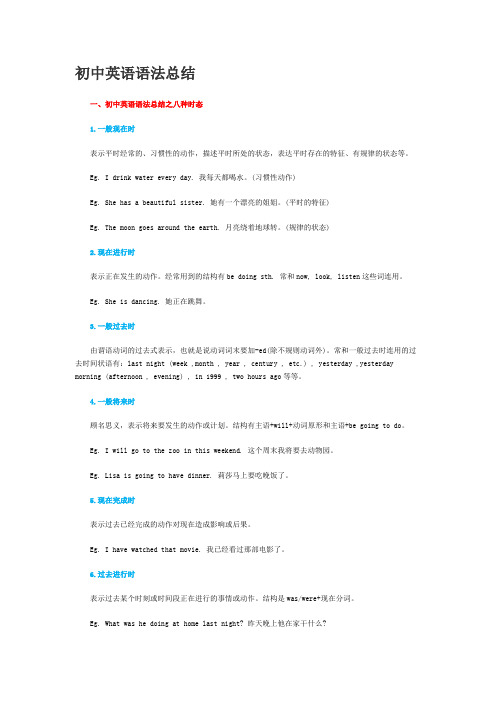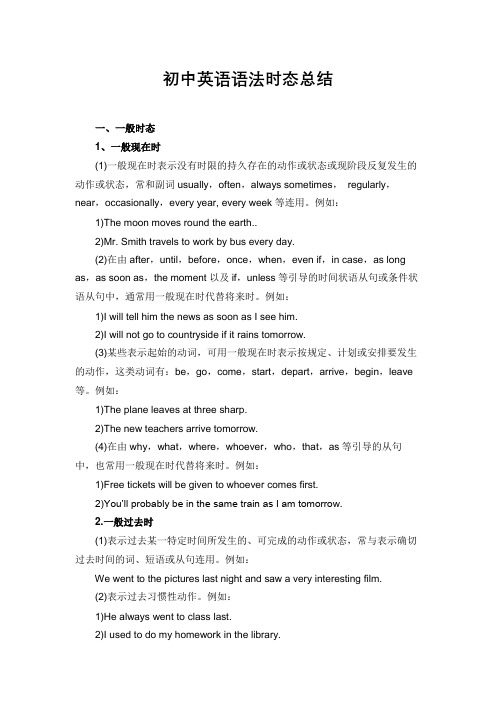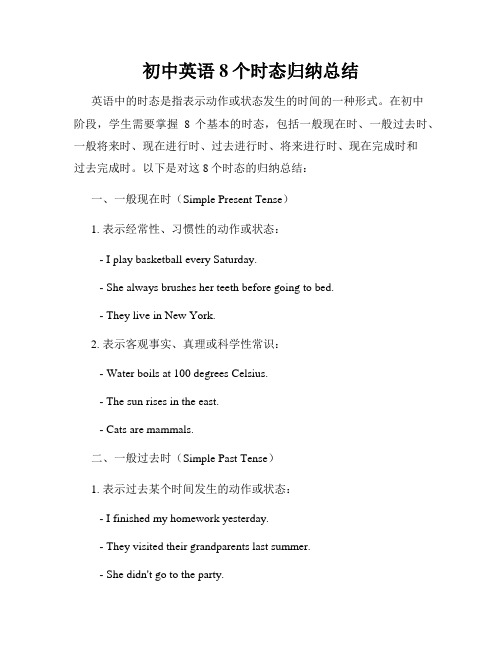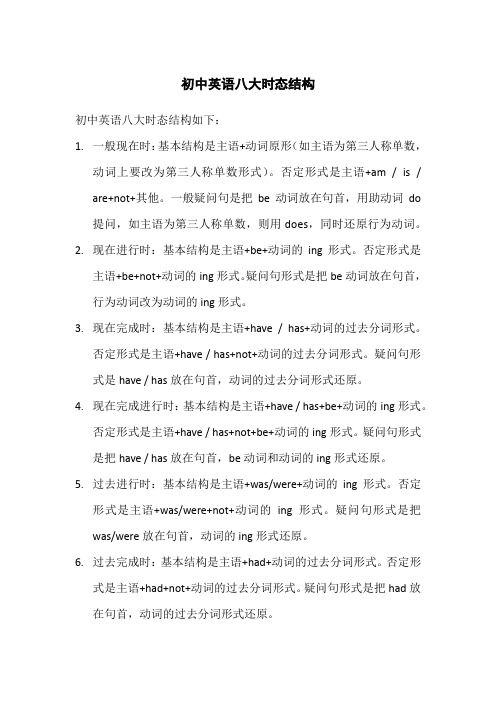初中一般时态
初中英语语法总结8种时态

初中英语语法总结一、初中英语语法总结之八种时态1.一般现在时表示平时经常的、习惯性的动作,描述平时所处的状态,表达平时存在的特征、有规律的状态等。
Eg. I drink water every day. 我每天都喝水。
(习惯性动作)Eg. She has a beautiful sister. 她有一个漂亮的姐姐。
(平时的特征)Eg. The moon goes around the earth. 月亮绕着地球转。
(规律的状态)2.现在进行时表示正在发生的动作。
经常用到的结构有be doing sth. 常和now, look, listen这些词连用。
Eg. She is dancing. 她正在跳舞。
3.一般过去时由谓语动词的过去式表示,也就是说动词词末要加-ed(除不规则动词外)。
常和一般过去时连用的过去时间状语有:last night (week ,month , year , century , etc.) , yesterday ,yesterday morning (afternoon , evening) , in 1999 , two hours ago等等。
4.一般将来时顾名思义,表示将来要发生的动作或计划。
结构有主语+will+动词原形和主语+be going to do。
Eg. I will go to the zoo in this weekend. 这个周末我将要去动物园。
Eg. Lisa is going to have dinner. 莉莎马上要吃晚饭了。
5.现在完成时表示过去已经完成的动作对现在造成影响或后果。
Eg. I have watched that movie. 我已经看过那部电影了。
6.过去进行时表示过去某个时刻或时间段正在进行的事情或动作。
结构是was/were+现在分词。
Eg. What was he doing at home last night? 昨天晚上他在家干什么?7.过去将来时表示过去的某时以后将要发生的动作。
(完整版)初中英语八大时态总结

初中英语八大时态总结一、一般现在时具体情况(主要用于下面几情况)1) 描述当前时间内经常出现、反复发生的动作或存在的状态。
在这种情景中,句子常带有表示频率的时间状语:always , everyday , often , once a week (month ,year , etc。
), sometimes , seldom , usually等等,以表示句中的动作或状态是习惯性的、经常性的。
例如:They raise ducks as a sideline 。
他们以养鸭为副业.It seldom rains here 。
这儿很少下雨.2)仅为了描述状态、性质、特征、能力等等。
这里的目的是为了"描述现阶段的动作或状态”,其重点”不是强调动作发生的时间、或进行的状态”。
例如:He can speak five foreign languages .他能说五种外语。
That is a beautiful city 。
那是座美丽的城市。
3)陈述客观事实、客观真理。
顾名思义,客观的情况是"没有时间概念"的;也"不会在意动作进行的状态”。
例如:The sun rises in the east .日出东方。
4)根据英文语法规定,当主句的谓语动词是一般将来时,那么时间或条件状语从句的谓语动词只能用一般现在时来表示将来要发生的动作.例如:I’ll tell him the news when he comes back. 他回来时,我将告诉他这个消息。
*【用于一般现在时的副词,除了上面提到的一些表示频率的以外,常见的还有:now, today , nowadays 等等】二、一般过去时具体情况(主要用于下面几情况)1.主要是用来描述在过去某个时候发生的动作或存在的状态。
它也可以用来表示在过去某段时间里经常发生的习惯性动作。
例:I was very thin in my childhood。
8个初中英语时态

8个初中英语时态8个初中英语时态是学习英语语法的重要组成部分,以下是它们的定义和例句:1. 现在一般时态:表示现在的动作或状态。
例如:I eat an apple every day. (我每天吃一个苹果。
)2. 过去一般时态:表示过去的动作或状态。
例如:She studied English last year. (她去年学了英语。
)3. 现在进行时态:表示正在进行的动作或状态。
例如:He is watching TV now. (他正在看电视。
)4. 过去进行时态:表示过去某个时间正在进行的动作或状态。
例如:They were having dinner when I called. (我打电话的时候他们正在吃饭。
)5. 现在完成时态:表示已经完成的动作或状态,强调对现在的影响。
例如:I have learned English for three years. (我已经学了三年英语了。
)6. 过去完成时态:表示过去某个时间之前已经完成的动作或状态。
例如:They had finished their homework by the time I arrived. (我到的时候他们已经完成作业了。
)7. 现在完成进行时态:表示从过去开始一直持续到现在的动作或状态,强调对现在的影响。
例如:He has been studying English for five years. (他已经学了五年英语了。
)8. 过去完成进行时态:表示从过去某个时间开始一直持续到过去的动作或状态。
例如:They had been waiting for the bus for an hour when I arrived. (我到的时候他们已经等了一个小时的车了。
)。
初中所有英语时态

初中英语语法时态总结一、一般时态1、一般现在时(1)一般现在时表示没有时限的持久存在的动作或状态或现阶段反复发生的动作或状态,常和副词usually,often,always sometimes,regularly,near,occasionally,every year, every week等连用。
例如:1)The moon moves round the earth..2)Mr. Smith travels to work by bus every day.(2)在由after,until,before,once,when,even if,in case,as long as,as soon as,the moment以及if,unless等引导的时间状语从句或条件状语从句中,通常用一般现在时代替将来时。
例如:1)I will tell him the news as soon as I see him.2)I will not go to countryside if it rains tomorrow.(3)某些表示起始的动词,可用一般现在时表示按规定、计划或安排要发生的动作,这类动词有:be,go,come,start,depart,arrive,begin,leave 等。
例如:1)The plane leaves at three sharp.2)The new teachers arrive tomorrow.(4)在由why,what,where,whoever,who,that,as等引导的从句中,也常用一般现在时代替将来时。
例如:1)Free tickets will be given to whoever comes first.2)You’ll probably be in the same train as I am tomorrow.2.一般过去时(1)表示过去某一特定时间所发生的、可完成的动作或状态,常与表示确切过去时间的词、短语或从句连用。
初中英语8个时态归纳总结

初中英语8个时态归纳总结英语中的时态是指表示动作或状态发生的时间的一种形式。
在初中阶段,学生需要掌握8个基本的时态,包括一般现在时、一般过去时、一般将来时、现在进行时、过去进行时、将来进行时、现在完成时和过去完成时。
以下是对这8个时态的归纳总结:一、一般现在时(Simple Present Tense)1. 表示经常性、习惯性的动作或状态:- I play basketball every Saturday.- She always brushes her teeth before going to bed.- They live in New York.2. 表示客观事实、真理或科学性常识:- Water boils at 100 degrees Celsius.- The sun rises in the east.- Cats are mammals.二、一般过去时(Simple Past Tense)1. 表示过去某个时间发生的动作或状态:- I finished my homework yesterday.- They visited their grandparents last summer.- She didn't go to the party.2. 表示过去的经历或习惯:- When I was young, I often went swimming. - He always ate breakfast at 8 o'clock.三、一般将来时(Simple Future Tense)1. 表示将来要发生的动作或事件:- I will go shopping tomorrow.- They are going to have a picnic next week. - She won't be late for the meeting.2. 表示将来的打算或意愿:- I am going to be a doctor when I grow up.- We will help you with your project.四、现在进行时(Present Continuous Tense)1. 表示现在正在进行的动作:- We are studying English at the moment.- He is playing soccer with his friends.- They aren't watching TV right now.2. 表示现阶段的趋势或变化:- The population is increasing rapidly.- More and more people are using smartphones.五、过去进行时(Past Continuous Tense)1. 表示过去某一时间段内正在进行的动作:- I was reading a book when the phone rang.- They were cooking dinner at 7 o'clock.2. 表示过去的同时发生的两个动作:- She was listening to music while doing her homework.六、将来进行时(Future Continuous Tense)1. 表示将来某一时间段内正在进行的动作:- Tomorrow, they will be flying to Paris.- I will be waiting for you at the station.2. 表示将来的预测或计划:- This time next month, I will be studying for my exams.七、现在完成时(Present Perfect Tense)1. 表示过去某一时间发生的动作对现在造成的影响或结果: - I have finished my homework, so I can watch TV now.- She has already eaten lunch.2. 表示过去某一时间内多次发生的动作:- We have visited that museum several times.八、过去完成时(Past Perfect Tense)1. 表示过去某一时间点之前已经完成的动作:- By the time they arrived, we had already left.- I had finished my work before the deadline.2. 表示过去的顺序或先后关系:- She realized that she had forgotten her keys after she locked the door.以上是初中英语的8个时态的归纳总结。
初中英语八大时态结构

初中英语八大时态结构初中英语八大时态结构如下:1.一般现在时:基本结构是主语+动词原形(如主语为第三人称单数,动词上要改为第三人称单数形式)。
否定形式是主语+am / is / are+not+其他。
一般疑问句是把be动词放在句首,用助动词do 提问,如主语为第三人称单数,则用does,同时还原行为动词。
2.现在进行时:基本结构是主语+be+动词的ing形式。
否定形式是主语+be+not+动词的ing形式。
疑问句形式是把be动词放在句首,行为动词改为动词的ing形式。
3.现在完成时:基本结构是主语+have / has+动词的过去分词形式。
否定形式是主语+have / has+not+动词的过去分词形式。
疑问句形式是have / has放在句首,动词的过去分词形式还原。
4.现在完成进行时:基本结构是主语+have / has+be+动词的ing形式。
否定形式是主语+have / has+not+be+动词的ing形式。
疑问句形式是把have / has放在句首,be动词和动词的ing形式还原。
5.过去进行时:基本结构是主语+was/were+动词的ing形式。
否定形式是主语+was/were+not+动词的ing形式。
疑问句形式是把was/were放在句首,动词的ing形式还原。
6.过去完成时:基本结构是主语+had+动词的过去分词形式。
否定形式是主语+had+not+动词的过去分词形式。
疑问句形式是把had放在句首,动词的过去分词形式还原。
7.过去完成进行时:基本结构是主语+had+be+动词的ing形式。
否定形式是主语+had+not+be+动词的ing形式。
疑问句形式是把had 放在句首,be动词和动词的ing形式还原。
8.一般将来时:基本结构是主语+will/shall/be going to+动词原形。
否定形式是主语+will/shall/be going to+not+动词原形。
疑问句形式是把will/shall/be going to放在句首,动词原形还原。
初中英语八大时态公式
初中英语八大时态公式1. 一般现在时(Simple Present Tense):-主语+ 动词原形(第三人称单数时,动词需加-s)-用来表示经常性、习惯性、普遍性的动作或事实。
-例句:She sings beautifully.(她唱歌很好。
)2. 一般过去时(Simple Past Tense):-主语+ 动词的过去式形式-用来表示过去的动作或事件。
-例句:I visited my grandparents last weekend.(上周末我去看望了我的祖父母。
)3. 一般将来时(Simple Future Tense):-主语+ will/shall + 动词原形-用来表示将来发生的动作或事件。
-例句:I will call you tomorrow.(明天我会给你打电话。
)4. 现在进行时(Present Continuous Tense):-主语+ am/is/are + 动词的现在分词形式-用来表示现在正在进行的动作。
-例句:They are playing in the park now.(他们现在正在公园里玩。
)5. 过去进行时(Past Continuous Tense):-主语+ was/were + 动词的现在分词形式-用来表示过去某个时刻正在进行的动作。
-例句:I was studying when the phone rang.(电话响的时候我正在学习。
)6. 将来进行时(Future Continuous Tense):-主语+ will be + 动词的现在分词形式-用来表示将来某个时刻正在进行的动作。
-例句:At this time tomorrow, I will be flying to Paris.(明天这个时候,我将在飞往巴黎的路上。
)7. 现在完成时(Present Perfect Tense):-主语+ have/has + 动词的过去分词形式-用来表示过去某个时刻开始并一直持续到现在的动作,或者强调与现在的关系。
初中英语语法八大时态总结(完整版)
初中英语语法八大时态一.一般现在时1. 结构肯定句式:主语+动词原形/动词的第三人称单数+其他否定句式:主语+ (助动词)don't/doesn't + 动词原形+其他一般疑问句式:Do/Does+主语+动词原形+其他简略回答:(肯)Yes,主语+do/does (否)No,主语+do/does not缩写形式:don't = do not does n't = does not例句:He often goes swimming in summer.I usually leave home for school at 7 every morning.1)表示经常的、习惯性的动作或存在的状态,常与表示频度的副词连用。
常用的频度副词有:always、often、usually 、seldom、never、sometimes, every week(day, year, mon th…),once a week, on Sun days.频度副词在句中通常放在行为动词之前,系动词、助动词之后。
例女口: He often goes swimming in summer.I usually leave home for school at 7 every morning.2)表示主语具备的性格、特征和能力等。
例如:All my family love football .My sister is always ready to help others .Ann writes good En glish but does not speak well.3)表示客观真理、客观存在、自然现象。
例如:The earth moves around the sun.Shan ghai lies in the east of China.4)表示按计划或安排好的,或将要发生的动作,可用一般现在时表将来。
初中英语时态一般现在时 现在进行时 一般过去时 过去进行时
一般现在时1. 一般现在时的基本用法:1) 经常性或习惯性的动作,常与表示频率副词的时间状语连用。
时间状语:every morning(afternoon, Sunday), sometimes, on Sunday, often, usually等.例如:I wake up at six O’clock every morning.My friends often go to the park on Sundays.2) 用于表示客观真理,客观存在,科学事实。
例如:The earth moves around the sun.Tomorrow is Tuesday.3) 用于格言或警句中。
例如:Where there is a will, there is a way.4) 用于表示现在时刻的状态、能力、性格、个性。
例如:I don't want so much.She is a good girl and always help others.My watch is very new。
2. 一般现在时的构成:当主语是第一人称,第二人称或第三人称复数时,谓语动词要用动词原形。
当主语是第三人称单数时,谓语动词要用第三人称单数形式,即动词词尾要加s或es. 例. We have four classes in the morning every day.They work in a big office.She likes singing very much.附注:动词的第三人称单数变化形式分为规则变化和不规则变化两种形式。
1. 规则变化:(1)直接在动词词尾加-s.ask---asks work---works get---gets stay---stays(2)以字母s, x, ch, sh或o结尾的动词,在词尾直接加-es.fix---fixes do---does go---goes pass---passeswatch---watches wash____washes(3)以“辅音字母加“y”结尾的动词,要先变y为i再加-es.try---tries study---studies cry---cries2.不规则变化:be---- is have----has3. 一般现在时的句子转换:变否定句、一般疑问句(1)一般疑问句:当句子中有be动词或情态动词时,则把be动词或情态动词提到主语的前面变成疑问句;否定句:在be动词或情态动词后面加not变成否定句.例:She is a student. I can swim.→Is she a student? →Can you swim?→She is not a student. →I can not swim.(2)一般疑问句:当句子中即没有be动词,也没有情态动词时,则在主语前加助动词do, does 变成问句;否定句:在主语后谓语动词前加助动词don’t, doesn’t变成否定句,助动词后的谓语动词要变成动词原形。
初中人教英语时态
初中人教英语时态一、现在一般时现在一般时表示现在时刻发生的动作或存在的状态。
其基本结构是“主语+谓语+宾语”,例如:I eat an apple every day.二、过去一般时过去一般时表示过去某个时间发生的动作或存在的状态。
其基本结构是“主语+谓语+宾语”,例如:She studied English last year.三、将来一般时将来一般时表示将来某个时间发生的动作或存在的状态。
其基本结构是“主语+will+谓语+宾语”,例如:He will visit his grandparents next week.四、现在进行时现在进行时表示现在正在进行的动作。
其基本结构是“主语+be 动词+谓语动词-ing”,例如:They are playing basketball now.五、过去进行时过去进行时表示过去某个时间正在进行的动作。
其基本结构是“主语+was/were+谓语动词-ing”,例如:They were having dinner at 6 o’clock yesterday.六、将来进行时将来进行时表示将来某个时间正在进行的动作。
其基本结构是“主语+will be+谓语动词-ing”,例如:They will be studying in the library next week.七、现在完成时现在完成时表示过去发生的动作或存在的状态,对现在造成的影响或结果。
其基本结构是“主语+have/has+谓语动词过去分词”,例如:I have finished my homework.八、过去完成时过去完成时表示过去的某个时间点之前已经完成的动作。
其基本结构是“主语+had+谓语动词过去分词”,例如:She had written a letter before she went to bed.。
- 1、下载文档前请自行甄别文档内容的完整性,平台不提供额外的编辑、内容补充、找答案等附加服务。
- 2、"仅部分预览"的文档,不可在线预览部分如存在完整性等问题,可反馈申请退款(可完整预览的文档不适用该条件!)。
- 3、如文档侵犯您的权益,请联系客服反馈,我们会尽快为您处理(人工客服工作时间:9:00-18:30)。
一般过去时一般现在时一般将来时一般现在时1. 一般现在时的定义表示经常性或习惯性的动作或状态。
谓语除第三人称单数须用第三人称单数形式外,其余情况都直接用动词的原形。
如:I read English in the morning.They play football in the afternoon.We don’t work on Sundays.He usually goes to school by bike.2. 一般现在时对谓语动词的要求当主语为第三人称单数时,动词须用第三人称单数形式。
其余用原形。
单三变化规则即:(1) 动词be为is;have为has。
(2) 动词后面一般加s。
如:play—plays, work—works, say—says, love—loves.(3) 在以辅音字母加y结尾的动词后,改y为i再加es。
如:study—studies, satisfy — satisfies, fly—flies.(4) 在以s, x, sh, ch, o结尾的动词后面加es。
如:fix—fixes, finish—finishes, watch — watches, do — does, go — goes.3. 一般现在时的应用(1)表示经常发生的动作或存在的状态。
常用频度副词sometimes, often, always, usually, seldom及时间副词every day / night / week / month / year, in the morning, in the afternoon, in the evening, at night做状语。
如:He often stays up late.We go home every month.I watch TV at night.(2)表示客观真理或永恒的状态。
如:The earth travels round the sun.Trees turn green in spring.Liquid turns into gas when it is hot enough.Practice makes perfect. 熟能生巧。
(3)现阶段的状态。
常跟时间副词now连用。
如:He lives in Beijing now.She is at home.They work in that factory.(4)习惯性的爱好或行为。
如:I like dancing while she likes singing.We get up at six.He studies very hard.(5)表示已经计划、安排好了或时间表上所安排,并且一定要做的事情。
用于这种句型的动词主要是瞬间动词:come, go, leave, arrive, begin, start, stop, close, open等。
如:The train arrives at five past eight and leaves at ten past eight.Our class begins at 7:45.The shop opens at eight o’clock.(6)时间、条件、方式及让步状语从句中的谓语动词是将来的动作或状态时,用一般现在时表示。
(主将从现)如:If you come, we will wait for you.When he gets here, the work will be finished.(7)某些习惯表达法。
如:The paper says the disease is under control.The diagram tells us that people’s living is improving.一般过去时1. 一般过去时的定义一般过去时表示过去某一时候或某一段时间所发生了的事情或存在的状态。
常与过去时间yesterday, this morning, just now, a moment ago, in May, last night / year / week, once upon a time, the other day, before …, when – clause, in the past连用。
如:What did you do yesterday?I met Lin Tao this morning.I was there a moment ago.2. 一般过去时对谓语动词的要求动词的过去式。
动词过去式的构成分规则变化和不规则变化两种形式,不规则变化通常需要逐个记忆,规则变化则遵循以下原则:(1) 一般在动词后加-ed。
如:play—played, offer—offered, weigh—weighed, destroy— destroyed, sign—signed.(2) 在以字母e结尾的动词后,只加-d。
如:like—liked, provide—provided, hate — hated, date—dated。
(3) 在以―辅音字母+y‖结尾的动词后,则改y为i,再加ed。
如:supply—supplied, fly—flied, study— studied.(4) 双写最后一个辅音字母,再加-ed。
如:plan-planned, stop-stopped, regret—regretted, ban—banned.3. 一般过去时的应用(1) 表示过去某时所发生的动作或存在的状态。
如:Liu Ying was in America last year.Jim rang you just now.(2) 表示过去经常或反复发生的动作。
常接时间副词often, usually, always, sometimes, every day / week, etc.如:We often went out for a walk after supper.We usually played together.一般将来时1. 一般将来时的定义一般将来时表示在现在看来即将要发生的动作或存在的状态。
常用时间副词tomorrow, soon 或短语next year / week / month, in a few days, in the future, sometime 做状语。
如:What will you do this afternoon.We will have a meeting tomorrow.He is going to study abroad next year.2. 一般将来时的结构及应用(1) shall / will + 动词原形。
表示即将发生的动作或存在的状态。
特别是表示客观性的事情或在某条件下要发生的事情。
如:What shall we do if he doesn’t come? 如果他不来,我们该怎么办?Will you be free this evening? 今天晚上有空吗?I think he will tell us the truth. 我想他会告诉我们真实情况的。
(2) be going to + 动词原形。
表示已经计划或安排好了的事情,也可表示有迹象表明肯定要发生的事情。
如:We are going to have a meeting to discuss the matter this evening.Look at the black clouds over there. I think it is going to rain soon.There is going to be an English evening this week.(3) be +现在分词。
进行时表将来,这个句型中动词主要是瞬间动词:come, go, leave, arrive, begin, start, stop, close, open, die, join, borrow, buy等。
如:Go ahead, and I’m coming.The dog is dying.Hurry up. The shop is closing.练习:一、单选1 Jenny ____ in an office. Her parents ____in a hospital.A work worksB works workC work are workingD is working work2 One of the boys_____ a black hat.A haveB there isC there areD has3 We will go shopping if it____ tomorrow.A don't rainB didn't rainC doesn't rainD isn't rain4 He said the sun ____in the east and ____in the west.A rose; setB rises; setsC rises, setD rise; sets5 Wang Mei ____ music and often ____ to music.A like; listenB likes; listensC like; are listeningD liking ; listen6 Jenny____ English every evening.A has studyB studiesC studyD studied7 She lived there before he____to China.A. cameB. comesC. comeD. coming8 I _____but_____nothing.A . was listened;was hearing B. listened;heard C . have listened; heard D. listened; heard of9 When did you ____here?A. got toB. reachedC. arrive inD. reach10 I____my homework at 7:00 yesterday evening.A. finishedB. would finishC. was finishingD. finish11 -He didn't go shopping with you yesterday afternoon, did he?- _______.A. No, he doesn'tB. Yes, he didn'tC. No, he didD. Yes, he did.12 -I have had supper.- When ____you____it?A. have; hadB. do, haveC. did,haveD. will have13 _____you ____a doctor when you grow up?A Will; going to beB Are; going to beC Are; /D Will; be14 I don’t know if his uncle _____.I think he _____ if it doesn’t rain.A will come; comesB will come; will comeC comes; comesD comes; will come15 He will be back _____a few minutes.A withB forC onD in16 What time _____we meet at the gate tomorrow?A willB shallC doD are17 He will have a holiday as soon as he _____the work next week.A finishesB doesn’t finishC will finishD won’t finish18 There _____some showers this afternoon.A will beB will haveC is going to beD are going to have19 It ____my brother’s birthday tomorrow. She _____a party.A is going to be; will haveB will be; is havingC will be; is going to haveD will have; is going to be20 Li Ming is 10 years old now, next year he _____11.A isB is going to beC will beD will to be二、填空1 I can take Li Ming there when he _____ ( come) to visit.2 _____your sister_____(know)English?3Her home____ _____ ______(远离)her school.4The pot_____(not look) like yours very much.5 Where _____you____(have)lunch every day?6 Who_____(想要)to go swimming?7 ______she_____(do) the housework every day?8 Jenny and Danny usually______(play) games in the afternoon .9 They____(be) on the farm a moment ago.10 There____(be)a shop not long ago.11 Jenny____(not go)to bed until 11:00 o'clock last night.12 Danny _____(read )English five minutes ago.13 I _____(see)Li Lei ____(go) out just now.14 He ____(do)his homework every day. But he __(not do)it yesterday.15 When I was young, I _____(play)games with my friends.16 When ____you_____(write)this book? I _____it last year.17 Did he____(have) lunch at home?18 I _____(eat) the bread, I 'm full now.。
